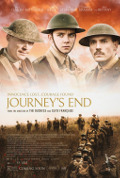
Directed by
Saul Dibb
107 minutes
Rated M
Reviewed by
Bernard Hemingway

Journey's End
Synopsis: Northern France, March, 1918. Captain Stanhope (Sam Claflin) arrives with C-company on the front-line trenches as a German offensive looms. The war is at a stalemate, the cost in human life has been devastating and every man knows that their turn maybe next. To make matters worse for Stanhope, an inexperienced young officer, Lieutenant Raleigh (Asa Butterfield), arrives to serve under him.
Understandably enough most war movies make relationships between men a prominent concern. The commitment to duty and the bonding over a sense of shared purpose plays out against the inflexible discipline and the presence of imminent death. Few movies however make this intense nexus as prominent as does Journey’s End which is based on a 1928 stage play by R.C. Sherriff who drew on his own experience as an officer in the tragedy which was, ironically as it turned out, called The Great War.
Although it is now near a century since WW1 ended Journey’s End has an immediacy that transcends its historical specifics and anyone interested in films about the human cost of war rather than war as a vehicle for large-scale action set-pieces will find it a powerful experience. Whilst there are a couple of those set-pieces, both skillfully and economically staged, for the most part the film focuses on a handful of characters who, for a good deal of the running time are hemmed in the underground bunker which serves as mission control for the British officers. Dibbs opts to use a lot of hand-held camera and as much as this is somewhat discomfitting it’s hard to argue with the choice. Discomfiture is, to say the least, the order of the day for these trench-bound men. Mention should also be made in this respect of Hildur Gudnadóttir and Natalie Holt’s disturbing original score.
Aside from Capt. Stanhope and Lt. Raleigh the frontline characters are the quietly-spoken Lt. Osborne (Paul Bettany), a schoolmaster in civvy street and Second Lts. Hibbert (Tom Sturridge), who is teetering on the brink of a nervous breakdown, and the contrastingly unflappable Trotter (Stephen Graham), along with the mothering Pte. Mason (Toby Jones), who cooks for the officers. The men are waiting for an impending German assault, one which Capt. Stanhope, who has been ordered to hold his position for as long as possible, knows will cost many lives. Even before that occurs, his superiors order him to conduct a raid on enemy trenches in daylight in order to bring back a German prisoner. Although Dibbs and writer-producer Simon Reade do not labour the point, the historical setting for the story is the kind of absurd upper-class-governed approach to warfare satirized so effectively in Oh! What A Lovely War (1969). Thus, as Capt. Stanhope wryly observes, the raid on the German trenches is timed to be done and dusted so that the top brass can have their “dinner at eight”.
The substance of Journey's End is however the portrait of the characters involved - on the one-hand the battle-weary, dis-illusioned men with no choice but to “see it through” and on the other the eager Lieutenant Raleigh with his naïve desire to relive his school days back in England with Captain Stanhope, three years his senior and the object of his sister’s affection. The latter, however, struggles to keep his sanity through a combination of will-power and whisky, on the one hand supported by the calming Lt. Osborne, supporting on the other the crumbling Lt Hibberd.
What is unusual, and engrossing, in this quietly grim story is the depth of caring between the men, whether it is Osborne putting the inebriated Stanhope to bed or preparing Raleigh for his baptism of fire or Mason apologizing that the tinned pineapples are in fact peaches. Perhaps there’s a little too much of the latter and his nice cups of tea but the fine cast bring the characters and the pathos of their situation home to us convincingly whilst the script never indulges in chest-beating anti-war rhetoric. Capturing tenderness in war speaks more than loudly enough against its waste.
There are some minor quibbles: Cpt Stanhope seems too old to be a mere three years ahead of Raleigh (in fact there are ten years between Claflin and Butterfield), Stephen Graham's Trotter, already a minor part, pretty much gets forgotten about as the film progresses and I feel that we deserved more of Lt. Osborne's final screen moments than we actually get. Nevertheless, overall, Journey's End is an impressively well-crafted, richly rewarding experience that will appeal especially to fans of the war film genre.
FYI: R.C. Sherriff was Oscar-nominated for his scripting contribution to Goodbye, Mr. Chips in 1939 elements of which can be seen here in the Lt Osborne character.

Want more about this film?


Want something different?




